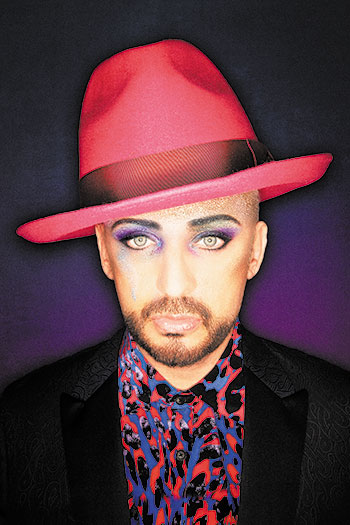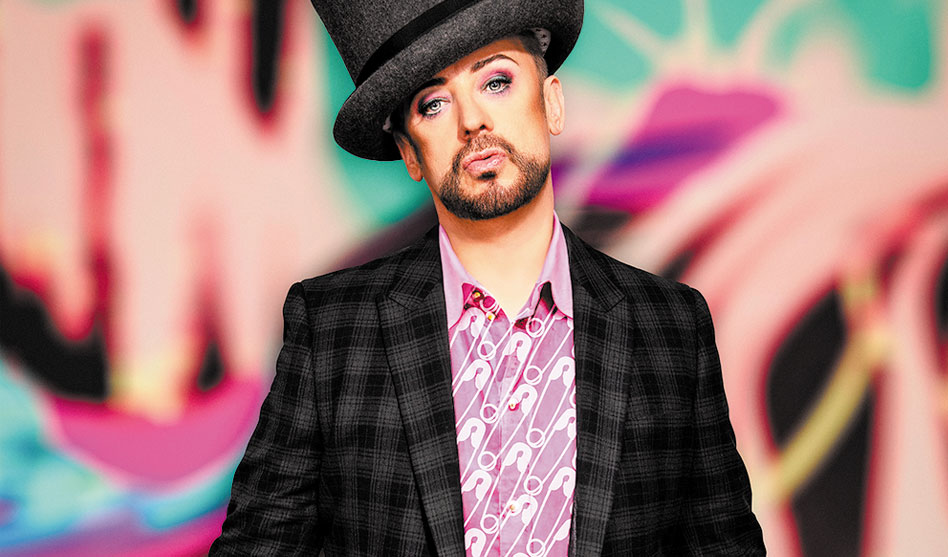Fame is no monster for queer icon Boy George
RICH LOPEZ | Staff writer
rich@dallasvoice.com
In this world of TikTok influencers and YouTube singers, fame is the game. There are the notions of fame meaning you are recognized or have your picture taken all the time. There are the perks and clout and, of course, the dollars.
But being famous can be a double-edged sword. It’s a sword that Boy George has learned to embrace and use to his advantage.
 George has been in the public eye since 1982, beginning as the front man for ’80s British pop band Culture Club when they debuted with the album Kissing to be Clever. The album yielded three top 10 hits, including the No. 1 single “Do You Really Want to Hurt Me.”
George has been in the public eye since 1982, beginning as the front man for ’80s British pop band Culture Club when they debuted with the album Kissing to be Clever. The album yielded three top 10 hits, including the No. 1 single “Do You Really Want to Hurt Me.”
With an eye-catching look and blatant queer vibes, George caught the attention of the public fast. But he kept that attention with a mix of both talent and fearlessness.
As his career progressed with both highs and lows (the band’s break up, drug abuse, a solo career), George’s fame was firmly set.
And he did it the old-fashioned way: He earned it.
These days, George is on the road playing his biggest hits along with some deep cuts and new tracks. Co-headlining with ’80s contemporaries Squeeze, the tour stops into North Texas at the Pavilion at Toyota Music Factor on Aug. 28. Before he heads back to the United States for the tour, Boy George (nee George O’Dowd) talked with Dallas Voice from his home country of England to discuss his own fame and why it’s just easier to be a nice guy than being a celebrity.
Dallas Voice: First, thank you for giving us time to chat with you. To get right into it, you are tremendously famous and have been for a long time. As you’ve lived with it, how do you embrace it now? Boy George: I love this question. I really enjoy it now, and I’ve sort of changed my mind about it in the last 10 years or so. I think I’ve really changed my relationship with fame.
What’s different now? What I find is that I’ve removed the anxiety of being in public, especially after something happened or however I look — dressed up or not. Now, whatever I look like and did or do is fine. And people don’t care. There were so many times I wasn’t looking great. When they see me, they mostly want a photo, and I’ve learned to really, just be nice to them. Be nice to everybody. It’s not that fucking complicated.
Did you feel like you had to be some sort of persona before? Well, there were many times I was just uptight. And as I’ve gotten older and happier, I’m less uptight now.
You know, what’s really good practice is being on Broadway. You meet people after the performance, and you’re spent, but they stay there to meet you.
Well, let’s talk about Broadway. You just did a stint as Harold Zidler in Moulin Rouge! this spring. How was that experience, because the casting sounds spot on for that character? I wanted to push myself and do more acting. I wasn’t doing that before, and I’m 63 now. Why say “no?” I really enjoyed it, and I plan to come back to the show. I think I need to explore more things more often.
Your last experience with Broadway was the Tony-nominated Taboo, the musical you wrote and Rosie O’Donnell produced here in 2003 about the New Romantics era of the late ’70s, early ’80s in England. Despite a successful run in the U.K., it had a challenging time here, with just 100 performances. Have there been any thoughts to revisiting that? I’m in the process of rewriting it. I want to bring it back in a different way. It needs to be even more taboo! Back then, it was a different climate, and there was pressure to dumb it down. I think now, Broadway is much more bold and tolerant so I can have fun with it and be bold and brave as well.
It’s interesting you want to explore acting when really, Boy George is your creation. Yes. I created Boy George, and I have this obligation to Boy George. I’ve dismantled him, and I am him. But I just want to be happy and be the best Boy George for me and for fans.
Going back to the fame thing: When you meet another famous person for the first time, do you shake hands and introduce yourselves or is there a commonality that allows you to be immediately familiar? So many famous people are weird, and I learn that the more I meet. Because I’ve been in that anxiety as well. Sometimes, I tend to be more open with another famous person, but really, famous people are just people.
You’re coming back to Dallas with this tour and with some iconic songs. How is it to tour and relate to these classic Culture Club tracks now? Well I’m not in love with Jon Moss now, singing these old songs. [Laughs] I love playing live, and this is my first solo tour in maybe 15, 20 years. I’m having fun, though, and bringing out some obscure Culture Club songs, my solo work and fun covers.
It’s always exciting to go out on stage and win over the audience, because people don’t know what I’m gonna do and I do everything. I have some staples, but I don’t do the same thing every night. I don’t begrudge singing the hits. I really enjoy it and I think it’s really impossible to go onstage and not put joy out there. People dance and cry, and it all feels emotional but also joyful.
For tickets, visit LiveNation.com.

